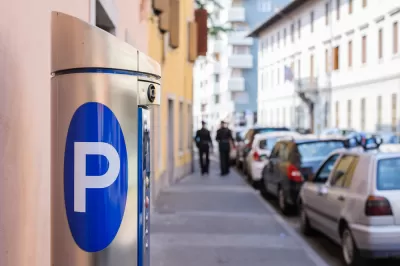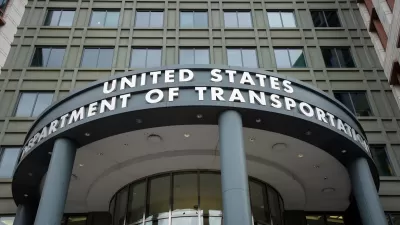The influence of Donald Shoup's classic book, "The High Cost of Free Parking," is becoming more and more apparent in more and more cities around the country.

"A handful of major cities across the U.S. are changing how they charge for some of the most valuable property they manage — on-street parking spaces," writes Rebecca Beitsch to introduce an article for the Pew Charitable Trusts.
Beitsch notes that for a long time, cities haven't valued on-street parking as much as drivers have. That is all changing, however:
Now, some major cities are seeking to take advantage of their supply and motorists’ demand with so-called demand-price parking. Rather than charge a flat rate for each spot in every area of the city, they are demanding motorists pay $4, $6 or up to $8 an hour for a spot on a busy street, close to shops and restaurants, while keeping hourly prices lower on less busy streets just a few blocks over.
Beitsch is describing the tenants of parking as revolutionized by Donald Shoup, as Planetizen readers are aware, while also adding a survey of the cities undertaking new approaches to the pricing of on-street parking. Programs in Washington, D.C., San Francisco, Los Angeles, and Seattle are mentioned—each citied for unique insights into the new practices of parking management. Beitsch also deliberately addresses common concerns about the new parking programs—like if they are harmful to the poor and whether or not they achieve their intended outcomes.
FULL STORY: Cities Try $6, $8 Hourly Parking to Cut Congestion, Pollution

Planetizen Federal Action Tracker
A weekly monitor of how Trump’s orders and actions are impacting planners and planning in America.

Maui's Vacation Rental Debate Turns Ugly
Verbal attacks, misinformation campaigns and fistfights plague a high-stakes debate to convert thousands of vacation rentals into long-term housing.

Restaurant Patios Were a Pandemic Win — Why Were They so Hard to Keep?
Social distancing requirements and changes in travel patterns prompted cities to pilot new uses for street and sidewalk space. Then it got complicated.

In California Battle of Housing vs. Environment, Housing Just Won
A new state law significantly limits the power of CEQA, an environmental review law that served as a powerful tool for blocking new development.

Boulder Eliminates Parking Minimums Citywide
Officials estimate the cost of building a single underground parking space at up to $100,000.

Orange County, Florida Adopts Largest US “Sprawl Repair” Code
The ‘Orange Code’ seeks to rectify decades of sprawl-inducing, car-oriented development.
Urban Design for Planners 1: Software Tools
This six-course series explores essential urban design concepts using open source software and equips planners with the tools they need to participate fully in the urban design process.
Planning for Universal Design
Learn the tools for implementing Universal Design in planning regulations.
Heyer Gruel & Associates PA
JM Goldson LLC
Custer County Colorado
City of Camden Redevelopment Agency
City of Astoria
Transportation Research & Education Center (TREC) at Portland State University
Jefferson Parish Government
Camden Redevelopment Agency
City of Claremont





























